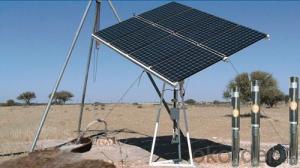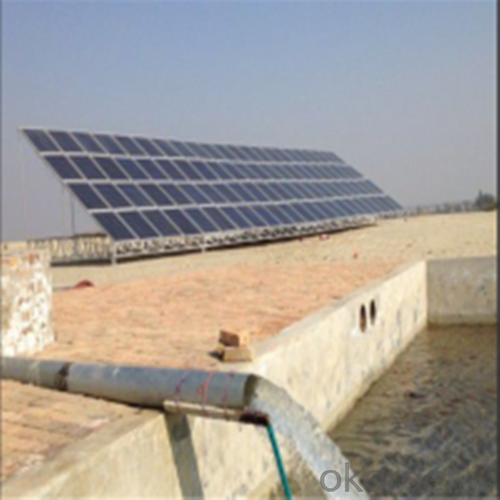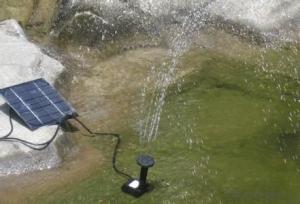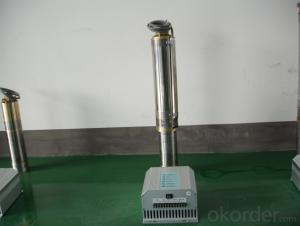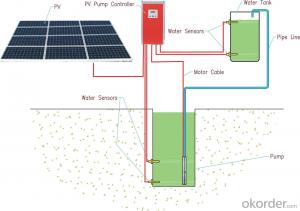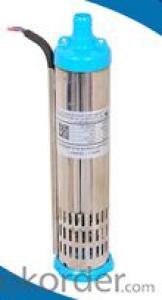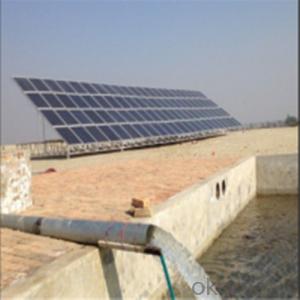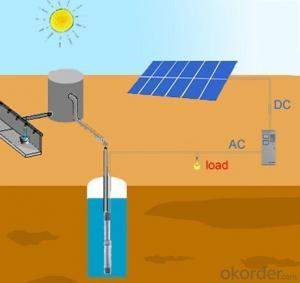Solar Pool Pump - Solar Power Water Pump
- Loading Port:
- Shanghai
- Payment Terms:
- TT OR LC
- Min Order Qty:
- 1 set
- Supply Capability:
- 1000 set/month
OKorder Service Pledge
OKorder Financial Service
You Might Also Like
Solar Pool Pumps Solar Power Pumps Solar Water Pumps
DC solar water pumping system consists of the motor, pump, controller, solar array and some other accessories, such as water level sensor, float switch, etc. Considered that storing water is more efficient than storing electricity, the system is designed to directly drive the pump without battery which can reduce the construction and operating cost and routine maintenance effectively.The PV array consists of multiple solar panels connected in series/parallel, which can supply the whole system as power source by converting the absorbed solar radiation energy to the electrical energy. The pump driven by a brushless DC permanent magnet motor draws water from deep-well or river. The pumped water is then fed into reservoir or water tank, or connected to the irrigation system or fountain system directly.
Advanced Technology
Applications Innovation
The efficiency of DC brushless permanent magnet motor has been increased up to 25% in comparison with traditional asynchronous motor.
Technology Innovation
Stator and rotor are sealed by environment friendly casting resin.Motor insulation resistance can be hold higher than 300MΩfor more than 10 years, which consumedly increased the security and reliability of the submersible motor.
Structure Innovation
Casting resign technology processed stator and rotor as well as the water lubricated bearing make the submersible pump environment friendly.
Feature
High Efficiency & High Reliability
DC Brushless Permanent Magnet Motor
Minimum Maintenance, long Service Life
Environment Friendly Materials, Lubricated Without Oil
Application
Village or Family Water Supply
Animal Drinking Water & Livestock Watering
Garden/Courtyard Irrigation
Swimming Pool
Water Supply for Bivouac or Camping Car
Water Supply for Remote Area
Automatic Control
Operate Automatically, No Need Watching
Maximum Power Point Tracking (MPPT)
Dry-run Protection
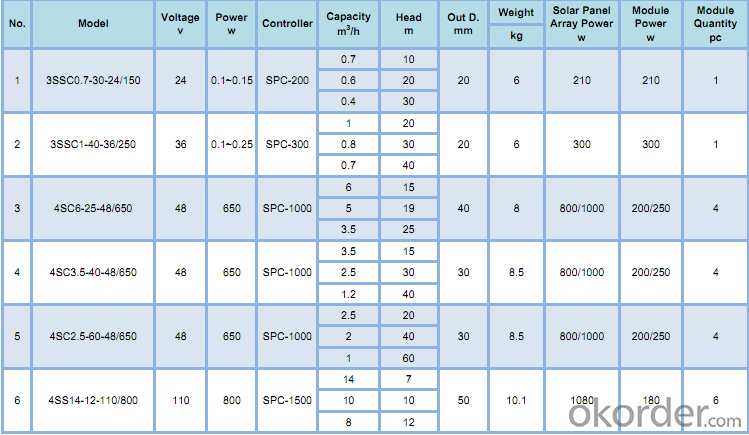
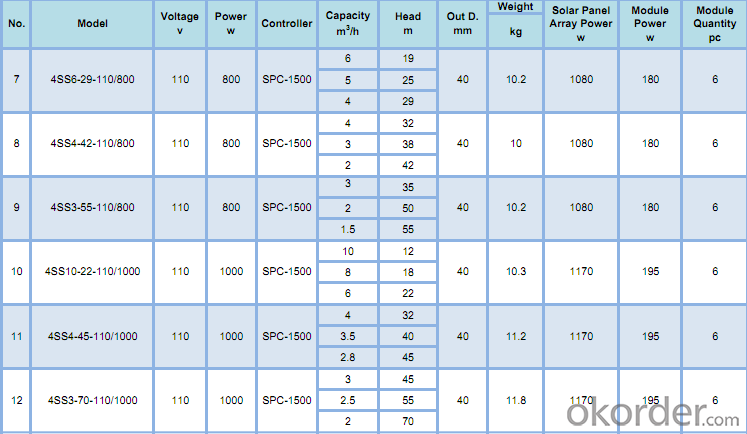
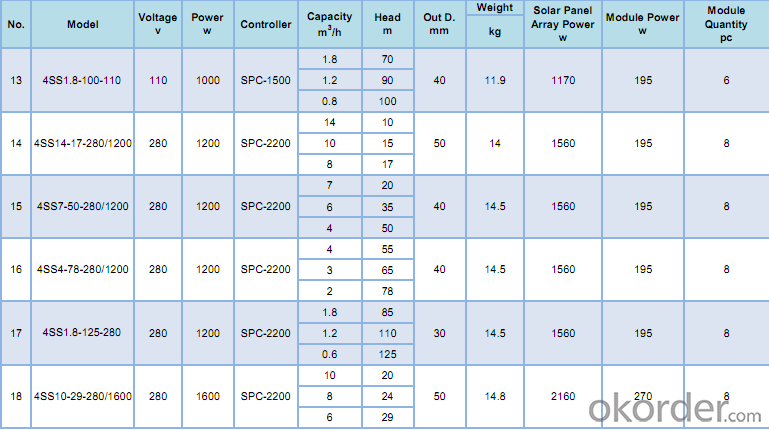
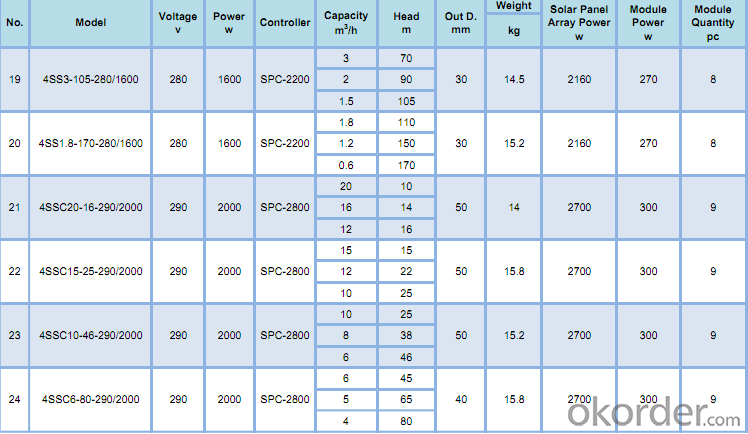
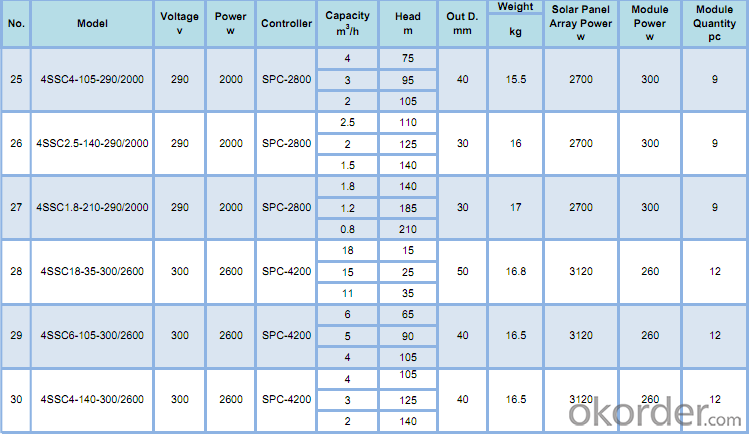
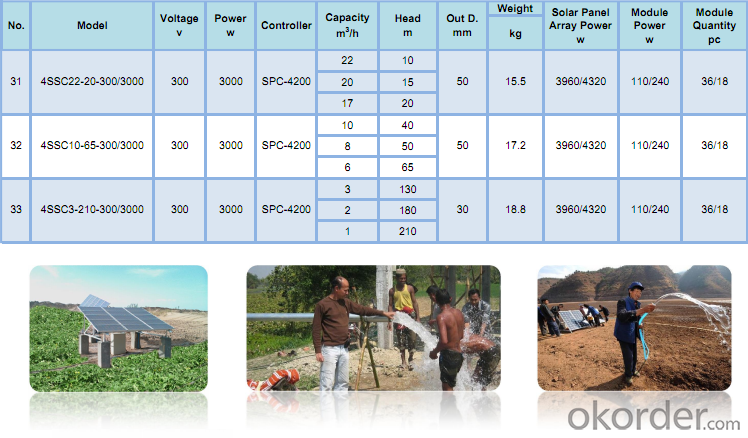
- Q: Are there any limitations to the type of water source that can be used with a solar pump?
- Indeed, there are limitations to the type of water source that can be utilized with a solar pump. One of the primary constraints pertains to the availability of sunlight. Given that solar pumps rely on solar energy for operation, they are most effective in regions with abundant sunlight. Should the water source be situated in a heavily shaded area or experience prolonged periods of cloudy weather, the efficiency and effectiveness of the solar pump may be compromised. Another limitation involves the depth of the water source. Solar pumps are generally unsuitable for extracting water from deep wells or boreholes. They are more commonly utilized for shallow water sources such as ponds, rivers, or shallow wells. The depth limitation stems from the fact that solar pumps possess limited power output in comparison to conventional electric pumps, rendering them less capable of lifting water from greater depths. The quality of the water source also warrants consideration. Solar pumps can handle clean or slightly contaminated water, but they may encounter difficulties with highly contaminated or saline water. This is due to the potential damage or clogging of pump components by certain impurities or chemicals present in the water, consequently reducing the pump's efficiency and lifespan. In such cases, additional filtration or pre-treatment systems may be necessary to ensure the longevity and optimal performance of the solar pump. Lastly, the flow rate and pressure requirements of the water source should be taken into account. Solar pumps have limitations when it comes to providing high flow rates or high-pressure outputs. If the water source necessitates a substantial volume of water or a high-pressure output, a solar pump may not be the most suitable choice. In conclusion, while solar pumps offer numerous advantages, it is crucial to consider the specific characteristics and limitations of the water source before opting for a solar pump.
- Q: Can a solar pump be used in areas with heavy rainfall?
- Yes, a solar pump can be used in areas with heavy rainfall. The rainfall does not affect the functioning of a solar pump as it relies on solar energy to operate. However, proper installation and maintenance should be considered to ensure efficient and reliable operation in such areas.
- Q: How much space is required for installing a solar pump?
- The space required for installing a solar pump depends on various factors such as the size and capacity of the pump, the solar panel system, and the water source. Generally, a solar pump requires adequate space for the solar panels to be mounted, which typically range from a few square meters to several square meters. Additionally, there should be enough space for the pump unit, valves, and piping system. The exact space requirement can vary significantly based on the specific requirements of the project and should be determined by a professional during the design phase.
- Q: How does a solar pump help in reducing water wastage?
- A solar pump helps in reducing water wastage by using renewable energy from the sun to power the pump and pump water. This eliminates the need for electricity or fossil fuels, which reduces the carbon footprint and energy consumption. Additionally, solar pumps typically have sensors and controls that optimize water usage, preventing over-watering or excessive use, thus minimizing water wastage.
- Q: How does the size of the water reservoir affect the performance of a solar pump?
- The size of the water reservoir does not directly affect the performance of a solar pump. However, a larger reservoir can provide a higher volume of water for the pump to draw from, resulting in a longer running time and potentially better overall performance.
- Q: Can solar pumps be installed by homeowners, or is professional installation necessary?
- Solar pumps can typically be installed by homeowners without professional assistance. They are designed to be user-friendly and come with detailed installation instructions. However, it is crucial for homeowners to have a basic understanding of the installation process and have some plumbing and electrical skills. If homeowners feel uncomfortable or lack the necessary knowledge, it is recommended to hire a professional to ensure a proper and safe installation.
- Q: Can a solar pump be used for water aeration in ponds and lakes?
- Yes, a solar pump can be used for water aeration in ponds and lakes. Solar pumps are designed to operate using solar energy, which makes them a sustainable and cost-effective option for water aeration. They can be used to circulate and oxygenate the water, improving its quality and promoting the growth of aquatic life.
- Q: Can a solar pump be used for water circulation in a cooling tower or industrial process?
- Certainly, a solar pump has the potential to be utilized for water circulation in a cooling tower or industrial process. The main purpose of solar pumps is to effectively utilize solar energy and convert it into mechanical energy to facilitate water circulation. They find extensive usage in diverse fields such as irrigation, water supply, and cooling systems. When it comes to a cooling tower or industrial process, a solar pump can be employed to ensure the smooth circulation of water within the system. This pump has the capability to draw water from a reservoir or well and subsequently distribute it throughout the cooling tower or industrial process. Consequently, it guarantees a continuous flow of water, essential for cooling or fulfilling other industrial requirements. The utilization of solar pumps in these applications brings about numerous advantages. Primarily, solar pumps are environmentally friendly since they derive their power exclusively from the sun. By diminishing reliance on fossil fuels and minimizing greenhouse gas emissions, they align perfectly with the growing inclination towards sustainable and renewable energy sources. Secondly, solar pumps tend to have minimal operating costs as they do not necessitate electricity from the grid. Once the initial investment in the solar pump system is made, the ongoing operational expenses are considerably low, leading to significant cost savings over time. Moreover, solar pumps are renowned for their reliability and the fact that they require minimal maintenance. These pumps are designed to withstand harsh environmental conditions and can function optimally even in remote areas with limited access to electricity. To summarize, a solar pump is undeniably a suitable choice for water circulation in a cooling tower or industrial process. It offers the advantages of sustainability, cost-effectiveness, and reliability, making it an appealing option for various industrial applications.
- Q: How does a solar pump handle water source contamination from oil drilling activities?
- A solar pump does not directly handle water source contamination from oil drilling activities. However, it can be used as an alternative source of water extraction where contamination has occurred, reducing the reliance on contaminated sources and minimizing the potential risks posed by oil drilling activities.
- Q: Solar water heater automatic pressurized water pump does not turn how maintenance
- For this place you do not understand, there are several ways for your reference: you can ask the professionals to see for you, to solve; can go to an experienced person to ask for advice, learn to master it;
Send your message to us
Solar Pool Pump - Solar Power Water Pump
- Loading Port:
- Shanghai
- Payment Terms:
- TT OR LC
- Min Order Qty:
- 1 set
- Supply Capability:
- 1000 set/month
OKorder Service Pledge
OKorder Financial Service
Similar products
Hot products
Hot Searches
Related keywords
